Management Strategies for Improving the Imperial Hotel's Performance
VerifiedAdded on 2023/01/17
|8
|2446
|36
Case Study
AI Summary
This case study examines the operational and management challenges faced by the Imperial Hotel, primarily focusing on issues within the front-of-house staff. The analysis highlights problems such as staff conflicts, inaccurate information dissemination, poor communication between departments, and negative guest experiences stemming from rude behavior and service inefficiencies. It also addresses high staff turnover, lack of training, and inadequate technology. The study proposes a three-point plan to address these issues, including implementing the latest hotel technologies, fostering a culture of togetherness, and emphasizing efficient teamwork through improved communication, reward systems, and decentralized decision-making. The conclusion emphasizes the interrelation of these problems and the importance of restructuring organizational culture, providing staff training, adopting a more flexible management style, and improving employee engagement to achieve financial stability, increased guest satisfaction, and a better brand image. The study suggests that timely corrective actions can revive the hotel's performance within 12 months.
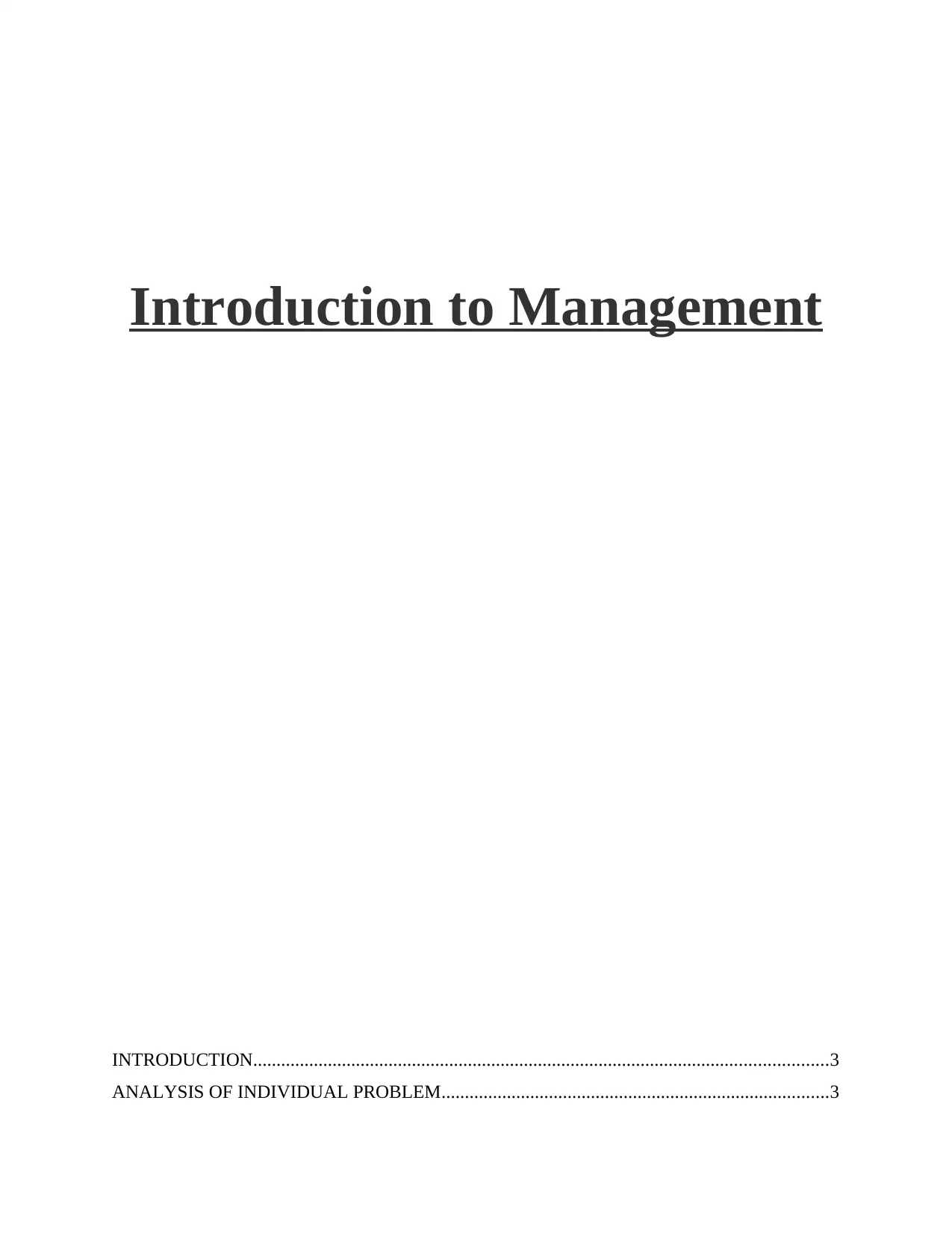
Introduction to Management
INTRODUCTION...........................................................................................................................3
ANALYSIS OF INDIVIDUAL PROBLEM...................................................................................3
INTRODUCTION...........................................................................................................................3
ANALYSIS OF INDIVIDUAL PROBLEM...................................................................................3
Paraphrase This Document
Need a fresh take? Get an instant paraphrase of this document with our AI Paraphraser
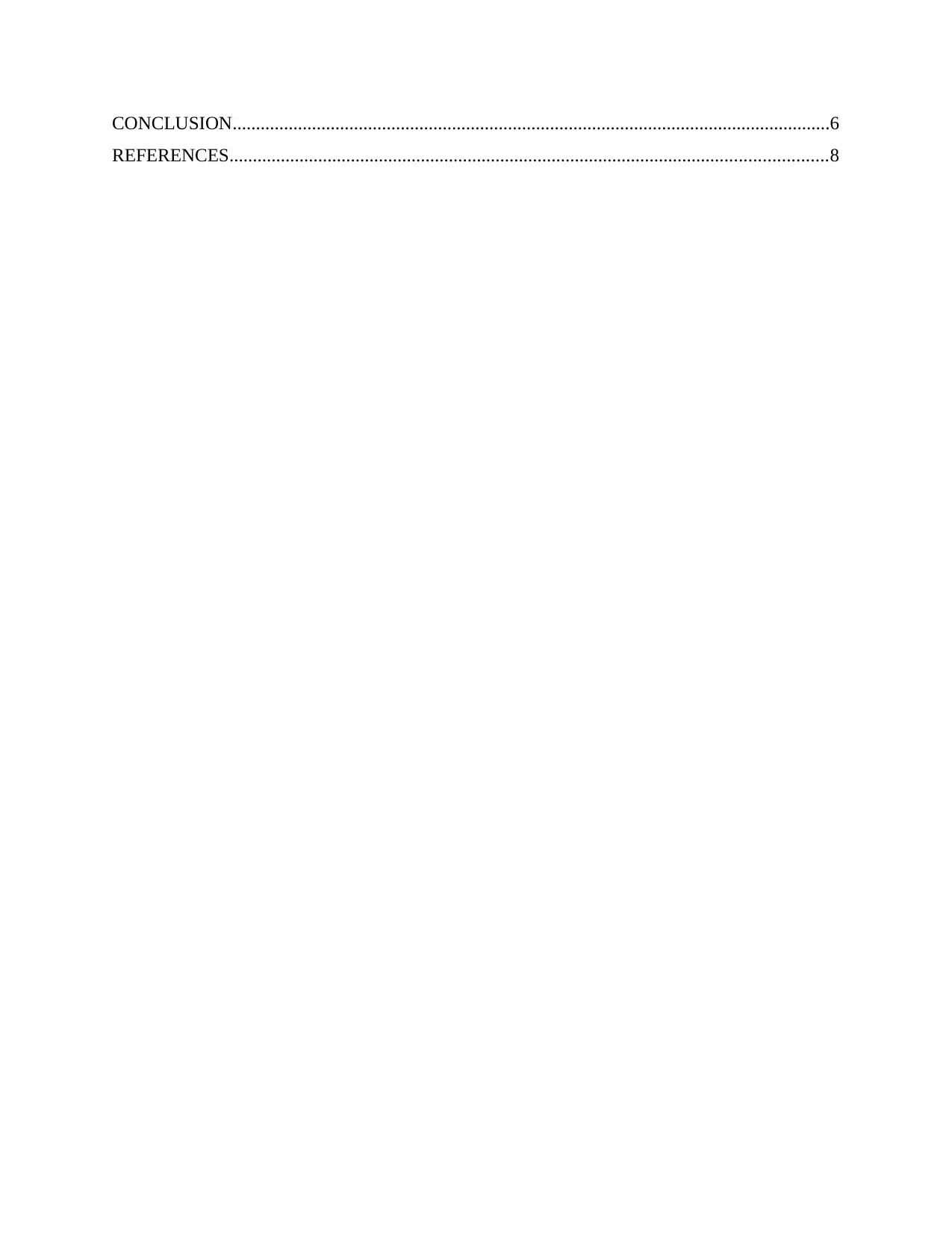
CONCLUSION................................................................................................................................6
REFERENCES................................................................................................................................8
REFERENCES................................................................................................................................8
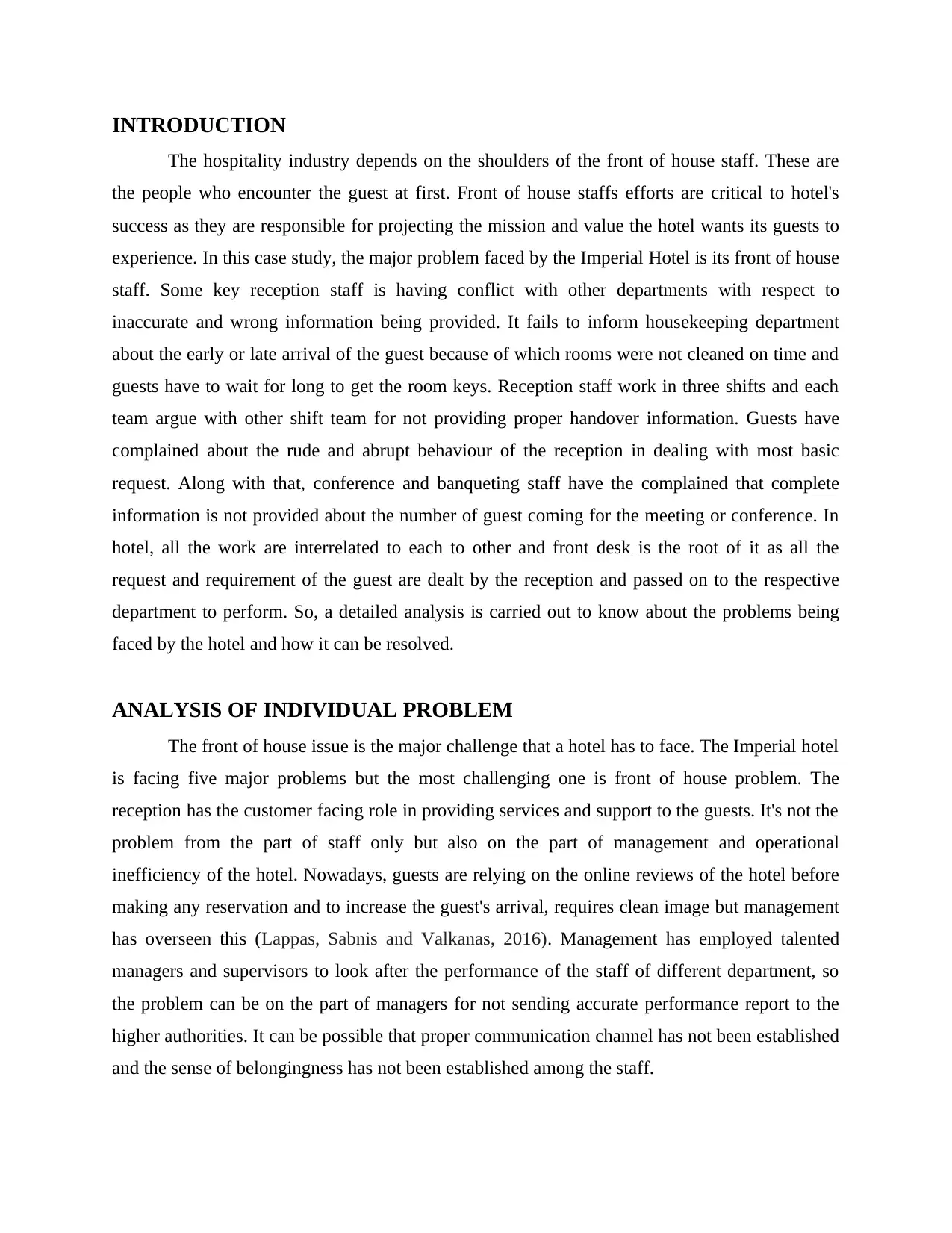
INTRODUCTION
The hospitality industry depends on the shoulders of the front of house staff. These are
the people who encounter the guest at first. Front of house staffs efforts are critical to hotel's
success as they are responsible for projecting the mission and value the hotel wants its guests to
experience. In this case study, the major problem faced by the Imperial Hotel is its front of house
staff. Some key reception staff is having conflict with other departments with respect to
inaccurate and wrong information being provided. It fails to inform housekeeping department
about the early or late arrival of the guest because of which rooms were not cleaned on time and
guests have to wait for long to get the room keys. Reception staff work in three shifts and each
team argue with other shift team for not providing proper handover information. Guests have
complained about the rude and abrupt behaviour of the reception in dealing with most basic
request. Along with that, conference and banqueting staff have the complained that complete
information is not provided about the number of guest coming for the meeting or conference. In
hotel, all the work are interrelated to each to other and front desk is the root of it as all the
request and requirement of the guest are dealt by the reception and passed on to the respective
department to perform. So, a detailed analysis is carried out to know about the problems being
faced by the hotel and how it can be resolved.
ANALYSIS OF INDIVIDUAL PROBLEM
The front of house issue is the major challenge that a hotel has to face. The Imperial hotel
is facing five major problems but the most challenging one is front of house problem. The
reception has the customer facing role in providing services and support to the guests. It's not the
problem from the part of staff only but also on the part of management and operational
inefficiency of the hotel. Nowadays, guests are relying on the online reviews of the hotel before
making any reservation and to increase the guest's arrival, requires clean image but management
has overseen this (Lappas, Sabnis and Valkanas, 2016). Management has employed talented
managers and supervisors to look after the performance of the staff of different department, so
the problem can be on the part of managers for not sending accurate performance report to the
higher authorities. It can be possible that proper communication channel has not been established
and the sense of belongingness has not been established among the staff.
The hospitality industry depends on the shoulders of the front of house staff. These are
the people who encounter the guest at first. Front of house staffs efforts are critical to hotel's
success as they are responsible for projecting the mission and value the hotel wants its guests to
experience. In this case study, the major problem faced by the Imperial Hotel is its front of house
staff. Some key reception staff is having conflict with other departments with respect to
inaccurate and wrong information being provided. It fails to inform housekeeping department
about the early or late arrival of the guest because of which rooms were not cleaned on time and
guests have to wait for long to get the room keys. Reception staff work in three shifts and each
team argue with other shift team for not providing proper handover information. Guests have
complained about the rude and abrupt behaviour of the reception in dealing with most basic
request. Along with that, conference and banqueting staff have the complained that complete
information is not provided about the number of guest coming for the meeting or conference. In
hotel, all the work are interrelated to each to other and front desk is the root of it as all the
request and requirement of the guest are dealt by the reception and passed on to the respective
department to perform. So, a detailed analysis is carried out to know about the problems being
faced by the hotel and how it can be resolved.
ANALYSIS OF INDIVIDUAL PROBLEM
The front of house issue is the major challenge that a hotel has to face. The Imperial hotel
is facing five major problems but the most challenging one is front of house problem. The
reception has the customer facing role in providing services and support to the guests. It's not the
problem from the part of staff only but also on the part of management and operational
inefficiency of the hotel. Nowadays, guests are relying on the online reviews of the hotel before
making any reservation and to increase the guest's arrival, requires clean image but management
has overseen this (Lappas, Sabnis and Valkanas, 2016). Management has employed talented
managers and supervisors to look after the performance of the staff of different department, so
the problem can be on the part of managers for not sending accurate performance report to the
higher authorities. It can be possible that proper communication channel has not been established
and the sense of belongingness has not been established among the staff.
⊘ This is a preview!⊘
Do you want full access?
Subscribe today to unlock all pages.

Trusted by 1+ million students worldwide
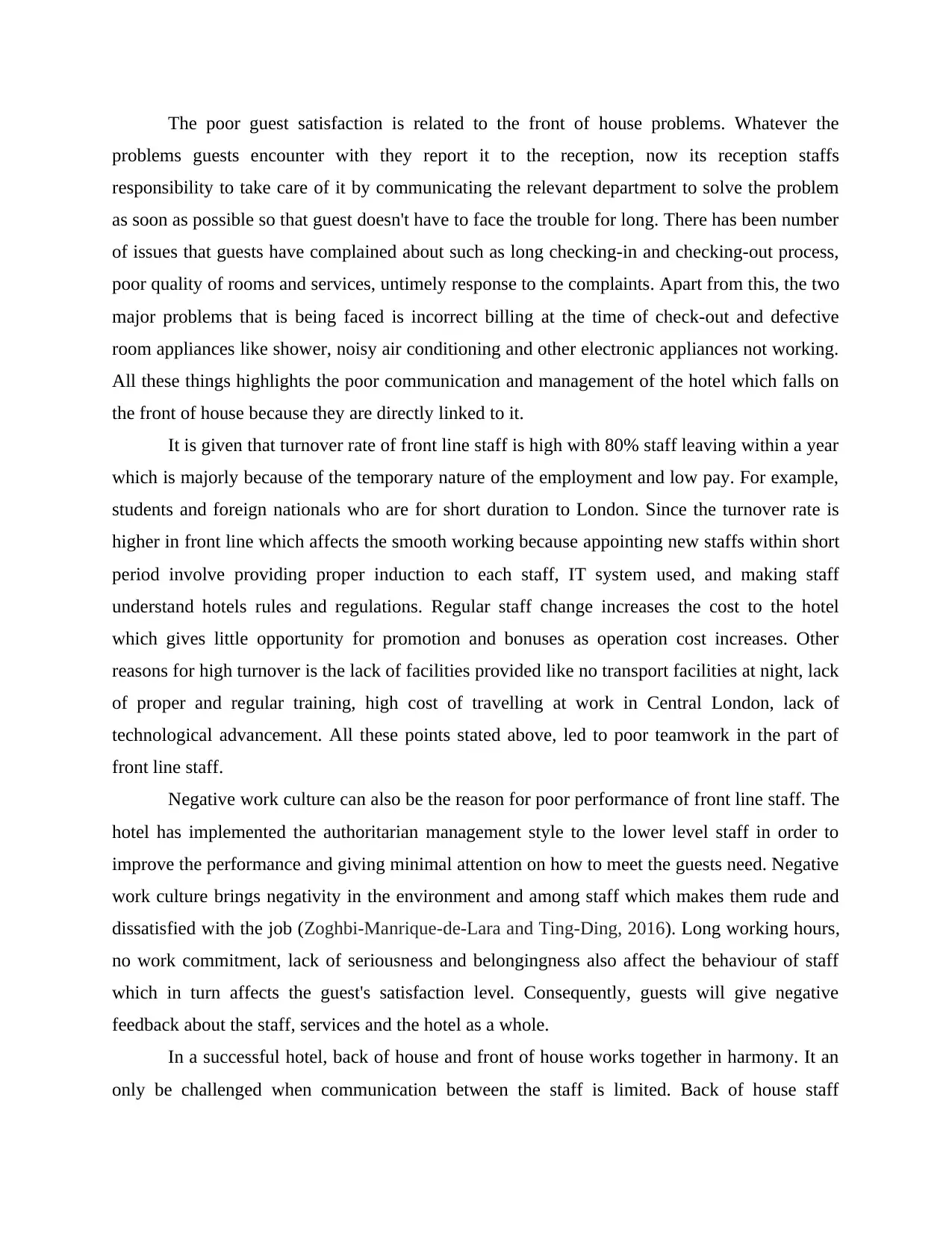
The poor guest satisfaction is related to the front of house problems. Whatever the
problems guests encounter with they report it to the reception, now its reception staffs
responsibility to take care of it by communicating the relevant department to solve the problem
as soon as possible so that guest doesn't have to face the trouble for long. There has been number
of issues that guests have complained about such as long checking-in and checking-out process,
poor quality of rooms and services, untimely response to the complaints. Apart from this, the two
major problems that is being faced is incorrect billing at the time of check-out and defective
room appliances like shower, noisy air conditioning and other electronic appliances not working.
All these things highlights the poor communication and management of the hotel which falls on
the front of house because they are directly linked to it.
It is given that turnover rate of front line staff is high with 80% staff leaving within a year
which is majorly because of the temporary nature of the employment and low pay. For example,
students and foreign nationals who are for short duration to London. Since the turnover rate is
higher in front line which affects the smooth working because appointing new staffs within short
period involve providing proper induction to each staff, IT system used, and making staff
understand hotels rules and regulations. Regular staff change increases the cost to the hotel
which gives little opportunity for promotion and bonuses as operation cost increases. Other
reasons for high turnover is the lack of facilities provided like no transport facilities at night, lack
of proper and regular training, high cost of travelling at work in Central London, lack of
technological advancement. All these points stated above, led to poor teamwork in the part of
front line staff.
Negative work culture can also be the reason for poor performance of front line staff. The
hotel has implemented the authoritarian management style to the lower level staff in order to
improve the performance and giving minimal attention on how to meet the guests need. Negative
work culture brings negativity in the environment and among staff which makes them rude and
dissatisfied with the job (Zoghbi-Manrique-de-Lara and Ting-Ding, 2016). Long working hours,
no work commitment, lack of seriousness and belongingness also affect the behaviour of staff
which in turn affects the guest's satisfaction level. Consequently, guests will give negative
feedback about the staff, services and the hotel as a whole.
In a successful hotel, back of house and front of house works together in harmony. It an
only be challenged when communication between the staff is limited. Back of house staff
problems guests encounter with they report it to the reception, now its reception staffs
responsibility to take care of it by communicating the relevant department to solve the problem
as soon as possible so that guest doesn't have to face the trouble for long. There has been number
of issues that guests have complained about such as long checking-in and checking-out process,
poor quality of rooms and services, untimely response to the complaints. Apart from this, the two
major problems that is being faced is incorrect billing at the time of check-out and defective
room appliances like shower, noisy air conditioning and other electronic appliances not working.
All these things highlights the poor communication and management of the hotel which falls on
the front of house because they are directly linked to it.
It is given that turnover rate of front line staff is high with 80% staff leaving within a year
which is majorly because of the temporary nature of the employment and low pay. For example,
students and foreign nationals who are for short duration to London. Since the turnover rate is
higher in front line which affects the smooth working because appointing new staffs within short
period involve providing proper induction to each staff, IT system used, and making staff
understand hotels rules and regulations. Regular staff change increases the cost to the hotel
which gives little opportunity for promotion and bonuses as operation cost increases. Other
reasons for high turnover is the lack of facilities provided like no transport facilities at night, lack
of proper and regular training, high cost of travelling at work in Central London, lack of
technological advancement. All these points stated above, led to poor teamwork in the part of
front line staff.
Negative work culture can also be the reason for poor performance of front line staff. The
hotel has implemented the authoritarian management style to the lower level staff in order to
improve the performance and giving minimal attention on how to meet the guests need. Negative
work culture brings negativity in the environment and among staff which makes them rude and
dissatisfied with the job (Zoghbi-Manrique-de-Lara and Ting-Ding, 2016). Long working hours,
no work commitment, lack of seriousness and belongingness also affect the behaviour of staff
which in turn affects the guest's satisfaction level. Consequently, guests will give negative
feedback about the staff, services and the hotel as a whole.
In a successful hotel, back of house and front of house works together in harmony. It an
only be challenged when communication between the staff is limited. Back of house staff
Paraphrase This Document
Need a fresh take? Get an instant paraphrase of this document with our AI Paraphraser
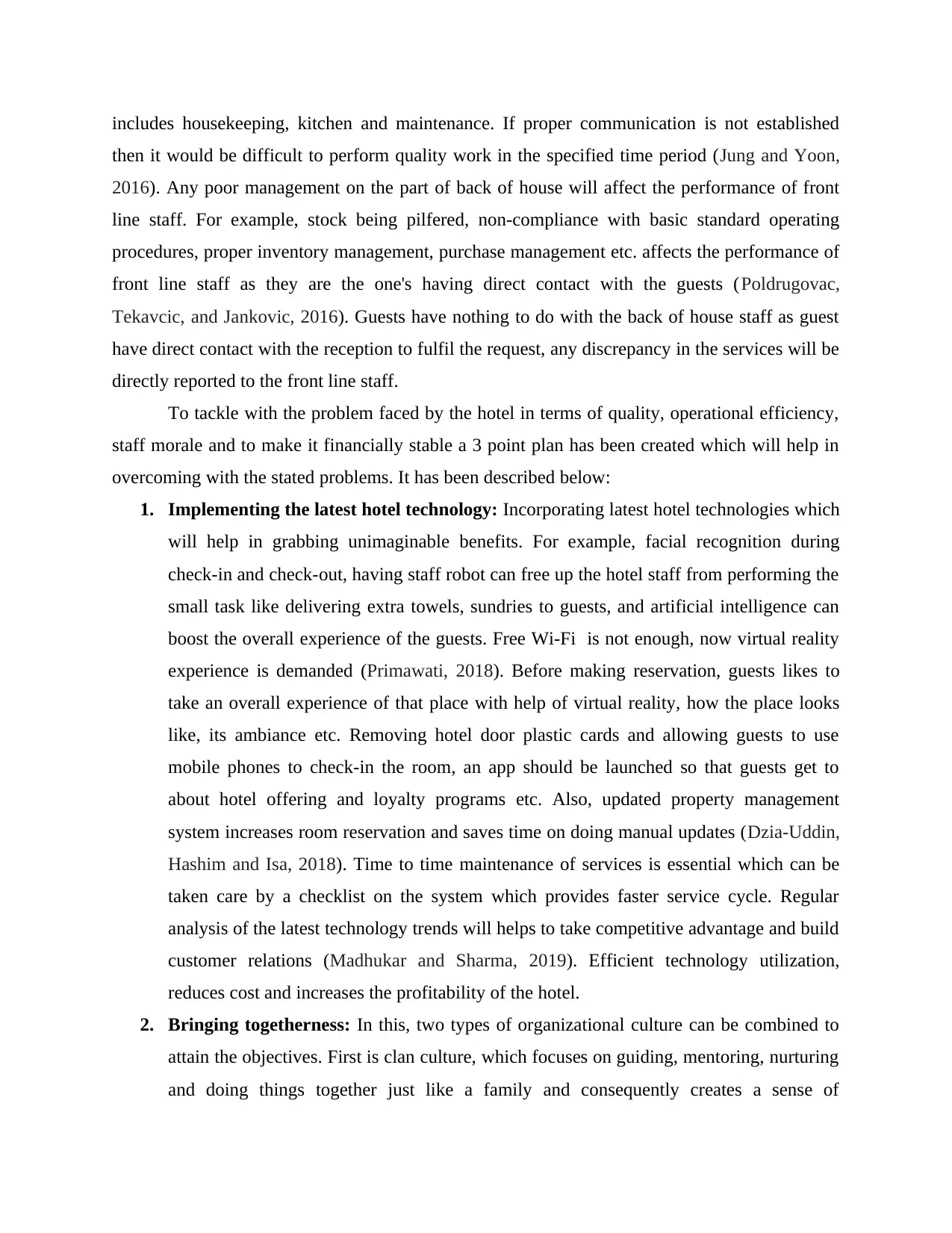
includes housekeeping, kitchen and maintenance. If proper communication is not established
then it would be difficult to perform quality work in the specified time period (Jung and Yoon,
2016). Any poor management on the part of back of house will affect the performance of front
line staff. For example, stock being pilfered, non-compliance with basic standard operating
procedures, proper inventory management, purchase management etc. affects the performance of
front line staff as they are the one's having direct contact with the guests (Poldrugovac,
Tekavcic, and Jankovic, 2016). Guests have nothing to do with the back of house staff as guest
have direct contact with the reception to fulfil the request, any discrepancy in the services will be
directly reported to the front line staff.
To tackle with the problem faced by the hotel in terms of quality, operational efficiency,
staff morale and to make it financially stable a 3 point plan has been created which will help in
overcoming with the stated problems. It has been described below:
1. Implementing the latest hotel technology: Incorporating latest hotel technologies which
will help in grabbing unimaginable benefits. For example, facial recognition during
check-in and check-out, having staff robot can free up the hotel staff from performing the
small task like delivering extra towels, sundries to guests, and artificial intelligence can
boost the overall experience of the guests. Free Wi-Fi is not enough, now virtual reality
experience is demanded (Primawati, 2018). Before making reservation, guests likes to
take an overall experience of that place with help of virtual reality, how the place looks
like, its ambiance etc. Removing hotel door plastic cards and allowing guests to use
mobile phones to check-in the room, an app should be launched so that guests get to
about hotel offering and loyalty programs etc. Also, updated property management
system increases room reservation and saves time on doing manual updates (Dzia-Uddin,
Hashim and Isa, 2018). Time to time maintenance of services is essential which can be
taken care by a checklist on the system which provides faster service cycle. Regular
analysis of the latest technology trends will helps to take competitive advantage and build
customer relations (Madhukar and Sharma, 2019). Efficient technology utilization,
reduces cost and increases the profitability of the hotel.
2. Bringing togetherness: In this, two types of organizational culture can be combined to
attain the objectives. First is clan culture, which focuses on guiding, mentoring, nurturing
and doing things together just like a family and consequently creates a sense of
then it would be difficult to perform quality work in the specified time period (Jung and Yoon,
2016). Any poor management on the part of back of house will affect the performance of front
line staff. For example, stock being pilfered, non-compliance with basic standard operating
procedures, proper inventory management, purchase management etc. affects the performance of
front line staff as they are the one's having direct contact with the guests (Poldrugovac,
Tekavcic, and Jankovic, 2016). Guests have nothing to do with the back of house staff as guest
have direct contact with the reception to fulfil the request, any discrepancy in the services will be
directly reported to the front line staff.
To tackle with the problem faced by the hotel in terms of quality, operational efficiency,
staff morale and to make it financially stable a 3 point plan has been created which will help in
overcoming with the stated problems. It has been described below:
1. Implementing the latest hotel technology: Incorporating latest hotel technologies which
will help in grabbing unimaginable benefits. For example, facial recognition during
check-in and check-out, having staff robot can free up the hotel staff from performing the
small task like delivering extra towels, sundries to guests, and artificial intelligence can
boost the overall experience of the guests. Free Wi-Fi is not enough, now virtual reality
experience is demanded (Primawati, 2018). Before making reservation, guests likes to
take an overall experience of that place with help of virtual reality, how the place looks
like, its ambiance etc. Removing hotel door plastic cards and allowing guests to use
mobile phones to check-in the room, an app should be launched so that guests get to
about hotel offering and loyalty programs etc. Also, updated property management
system increases room reservation and saves time on doing manual updates (Dzia-Uddin,
Hashim and Isa, 2018). Time to time maintenance of services is essential which can be
taken care by a checklist on the system which provides faster service cycle. Regular
analysis of the latest technology trends will helps to take competitive advantage and build
customer relations (Madhukar and Sharma, 2019). Efficient technology utilization,
reduces cost and increases the profitability of the hotel.
2. Bringing togetherness: In this, two types of organizational culture can be combined to
attain the objectives. First is clan culture, which focuses on guiding, mentoring, nurturing
and doing things together just like a family and consequently creates a sense of
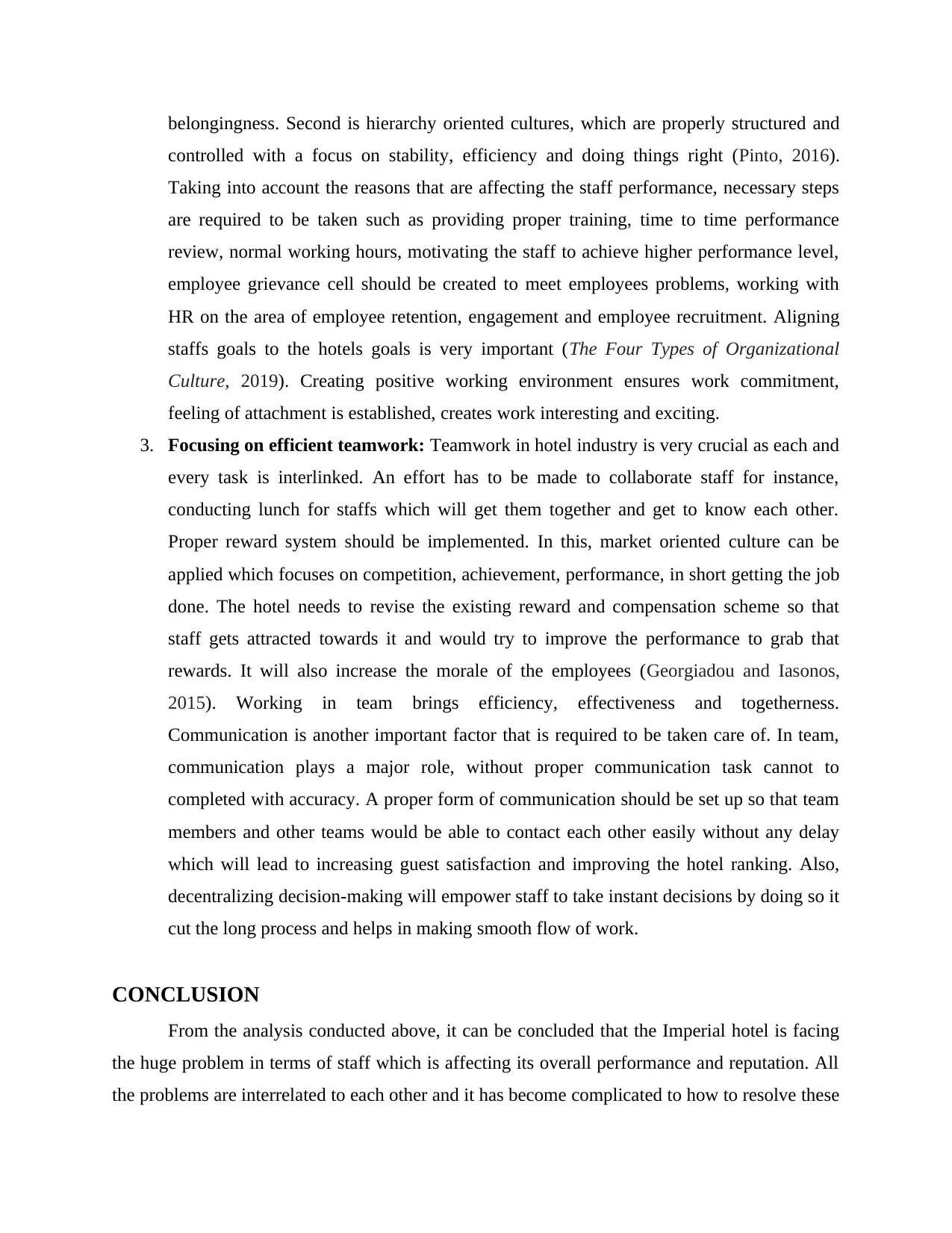
belongingness. Second is hierarchy oriented cultures, which are properly structured and
controlled with a focus on stability, efficiency and doing things right (Pinto, 2016).
Taking into account the reasons that are affecting the staff performance, necessary steps
are required to be taken such as providing proper training, time to time performance
review, normal working hours, motivating the staff to achieve higher performance level,
employee grievance cell should be created to meet employees problems, working with
HR on the area of employee retention, engagement and employee recruitment. Aligning
staffs goals to the hotels goals is very important (The Four Types of Organizational
Culture, 2019). Creating positive working environment ensures work commitment,
feeling of attachment is established, creates work interesting and exciting.
3. Focusing on efficient teamwork: Teamwork in hotel industry is very crucial as each and
every task is interlinked. An effort has to be made to collaborate staff for instance,
conducting lunch for staffs which will get them together and get to know each other.
Proper reward system should be implemented. In this, market oriented culture can be
applied which focuses on competition, achievement, performance, in short getting the job
done. The hotel needs to revise the existing reward and compensation scheme so that
staff gets attracted towards it and would try to improve the performance to grab that
rewards. It will also increase the morale of the employees (Georgiadou and Iasonos,
2015). Working in team brings efficiency, effectiveness and togetherness.
Communication is another important factor that is required to be taken care of. In team,
communication plays a major role, without proper communication task cannot to
completed with accuracy. A proper form of communication should be set up so that team
members and other teams would be able to contact each other easily without any delay
which will lead to increasing guest satisfaction and improving the hotel ranking. Also,
decentralizing decision-making will empower staff to take instant decisions by doing so it
cut the long process and helps in making smooth flow of work.
CONCLUSION
From the analysis conducted above, it can be concluded that the Imperial hotel is facing
the huge problem in terms of staff which is affecting its overall performance and reputation. All
the problems are interrelated to each other and it has become complicated to how to resolve these
controlled with a focus on stability, efficiency and doing things right (Pinto, 2016).
Taking into account the reasons that are affecting the staff performance, necessary steps
are required to be taken such as providing proper training, time to time performance
review, normal working hours, motivating the staff to achieve higher performance level,
employee grievance cell should be created to meet employees problems, working with
HR on the area of employee retention, engagement and employee recruitment. Aligning
staffs goals to the hotels goals is very important (The Four Types of Organizational
Culture, 2019). Creating positive working environment ensures work commitment,
feeling of attachment is established, creates work interesting and exciting.
3. Focusing on efficient teamwork: Teamwork in hotel industry is very crucial as each and
every task is interlinked. An effort has to be made to collaborate staff for instance,
conducting lunch for staffs which will get them together and get to know each other.
Proper reward system should be implemented. In this, market oriented culture can be
applied which focuses on competition, achievement, performance, in short getting the job
done. The hotel needs to revise the existing reward and compensation scheme so that
staff gets attracted towards it and would try to improve the performance to grab that
rewards. It will also increase the morale of the employees (Georgiadou and Iasonos,
2015). Working in team brings efficiency, effectiveness and togetherness.
Communication is another important factor that is required to be taken care of. In team,
communication plays a major role, without proper communication task cannot to
completed with accuracy. A proper form of communication should be set up so that team
members and other teams would be able to contact each other easily without any delay
which will lead to increasing guest satisfaction and improving the hotel ranking. Also,
decentralizing decision-making will empower staff to take instant decisions by doing so it
cut the long process and helps in making smooth flow of work.
CONCLUSION
From the analysis conducted above, it can be concluded that the Imperial hotel is facing
the huge problem in terms of staff which is affecting its overall performance and reputation. All
the problems are interrelated to each other and it has become complicated to how to resolve these
⊘ This is a preview!⊘
Do you want full access?
Subscribe today to unlock all pages.

Trusted by 1+ million students worldwide
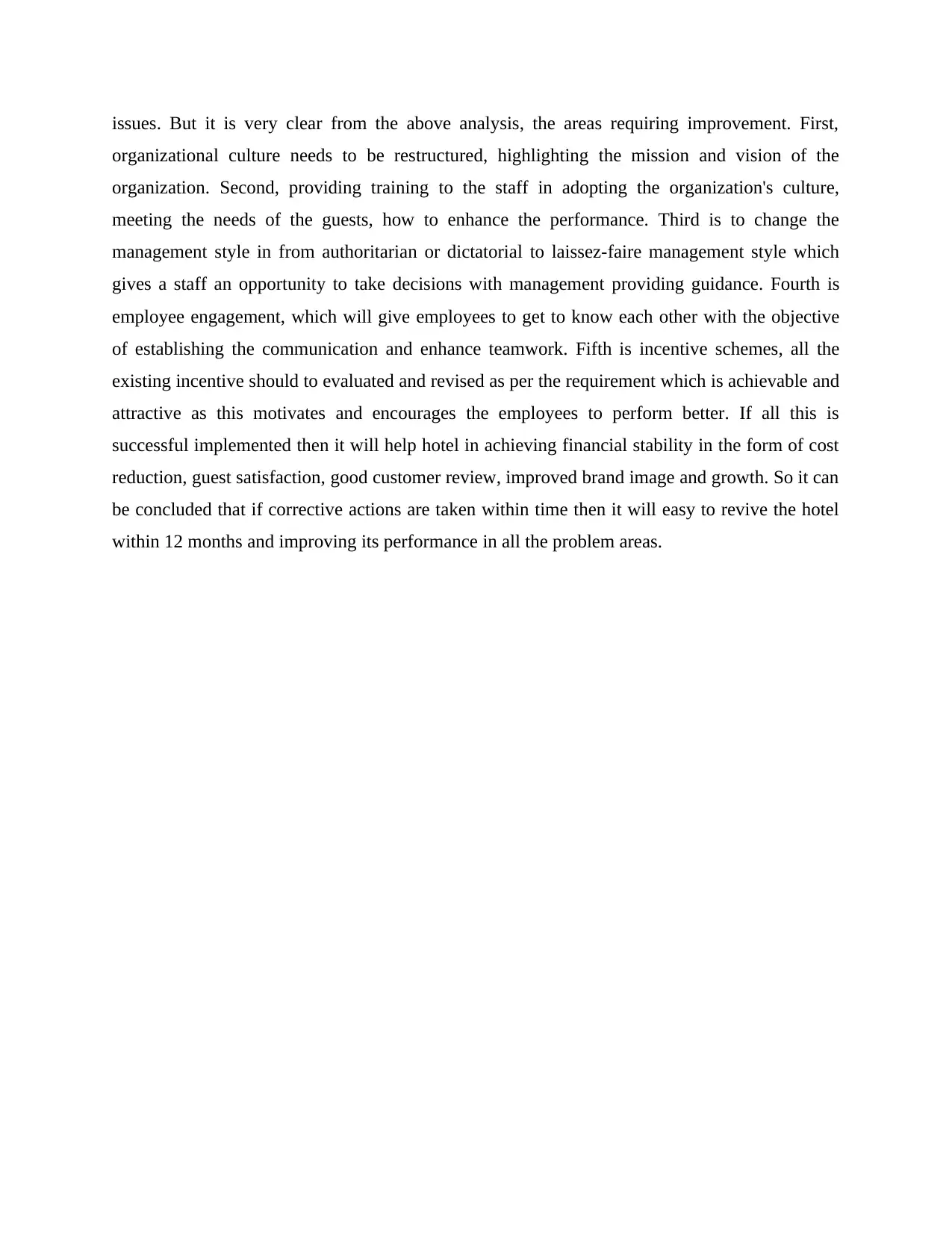
issues. But it is very clear from the above analysis, the areas requiring improvement. First,
organizational culture needs to be restructured, highlighting the mission and vision of the
organization. Second, providing training to the staff in adopting the organization's culture,
meeting the needs of the guests, how to enhance the performance. Third is to change the
management style in from authoritarian or dictatorial to laissez-faire management style which
gives a staff an opportunity to take decisions with management providing guidance. Fourth is
employee engagement, which will give employees to get to know each other with the objective
of establishing the communication and enhance teamwork. Fifth is incentive schemes, all the
existing incentive should to evaluated and revised as per the requirement which is achievable and
attractive as this motivates and encourages the employees to perform better. If all this is
successful implemented then it will help hotel in achieving financial stability in the form of cost
reduction, guest satisfaction, good customer review, improved brand image and growth. So it can
be concluded that if corrective actions are taken within time then it will easy to revive the hotel
within 12 months and improving its performance in all the problem areas.
organizational culture needs to be restructured, highlighting the mission and vision of the
organization. Second, providing training to the staff in adopting the organization's culture,
meeting the needs of the guests, how to enhance the performance. Third is to change the
management style in from authoritarian or dictatorial to laissez-faire management style which
gives a staff an opportunity to take decisions with management providing guidance. Fourth is
employee engagement, which will give employees to get to know each other with the objective
of establishing the communication and enhance teamwork. Fifth is incentive schemes, all the
existing incentive should to evaluated and revised as per the requirement which is achievable and
attractive as this motivates and encourages the employees to perform better. If all this is
successful implemented then it will help hotel in achieving financial stability in the form of cost
reduction, guest satisfaction, good customer review, improved brand image and growth. So it can
be concluded that if corrective actions are taken within time then it will easy to revive the hotel
within 12 months and improving its performance in all the problem areas.
Paraphrase This Document
Need a fresh take? Get an instant paraphrase of this document with our AI Paraphraser
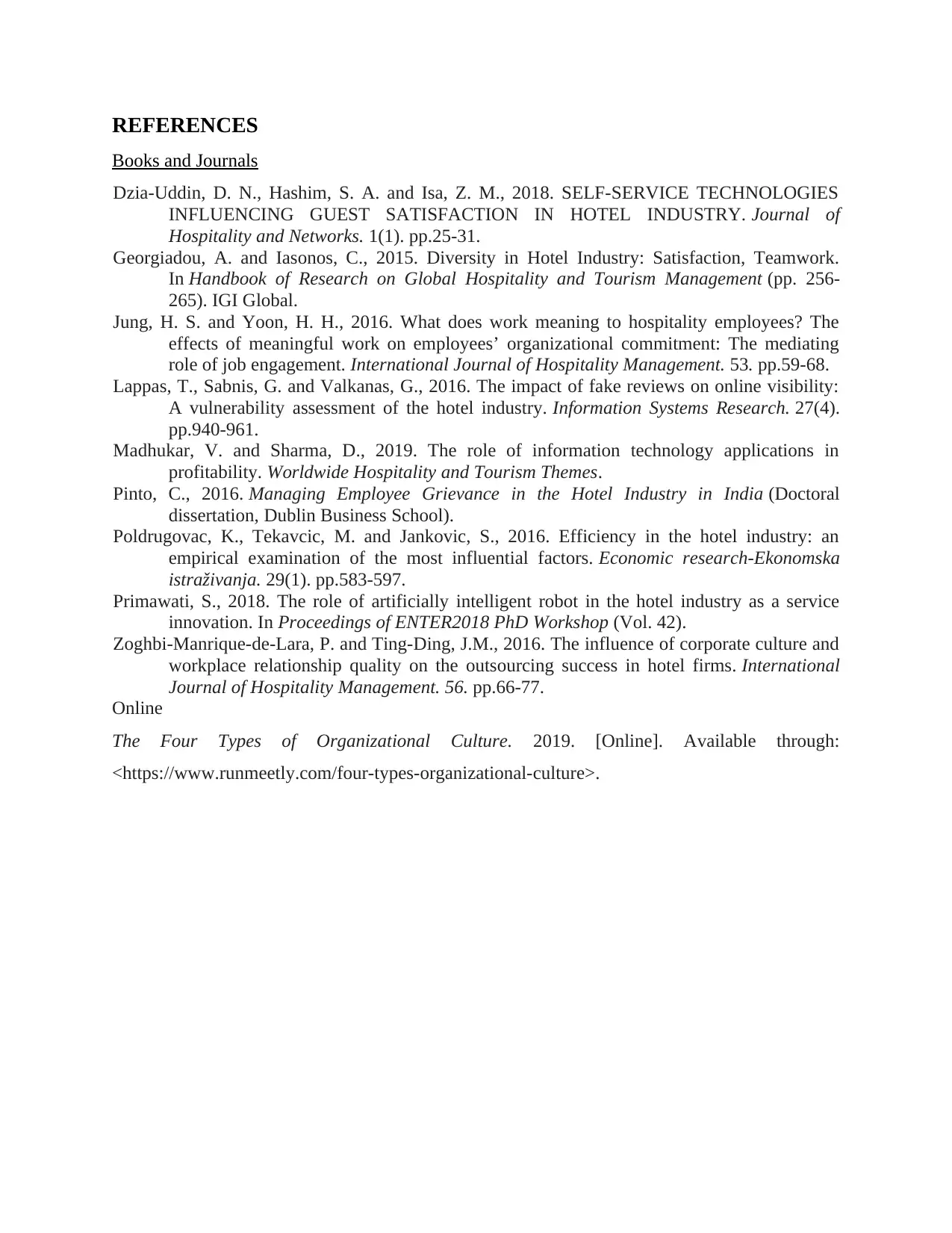
REFERENCES
Books and Journals
Dzia-Uddin, D. N., Hashim, S. A. and Isa, Z. M., 2018. SELF-SERVICE TECHNOLOGIES
INFLUENCING GUEST SATISFACTION IN HOTEL INDUSTRY. Journal of
Hospitality and Networks. 1(1). pp.25-31.
Georgiadou, A. and Iasonos, C., 2015. Diversity in Hotel Industry: Satisfaction, Teamwork.
In Handbook of Research on Global Hospitality and Tourism Management (pp. 256-
265). IGI Global.
Jung, H. S. and Yoon, H. H., 2016. What does work meaning to hospitality employees? The
effects of meaningful work on employees’ organizational commitment: The mediating
role of job engagement. International Journal of Hospitality Management. 53. pp.59-68.
Lappas, T., Sabnis, G. and Valkanas, G., 2016. The impact of fake reviews on online visibility:
A vulnerability assessment of the hotel industry. Information Systems Research. 27(4).
pp.940-961.
Madhukar, V. and Sharma, D., 2019. The role of information technology applications in
profitability. Worldwide Hospitality and Tourism Themes.
Pinto, C., 2016. Managing Employee Grievance in the Hotel Industry in India (Doctoral
dissertation, Dublin Business School).
Poldrugovac, K., Tekavcic, M. and Jankovic, S., 2016. Efficiency in the hotel industry: an
empirical examination of the most influential factors. Economic research-Ekonomska
istraživanja. 29(1). pp.583-597.
Primawati, S., 2018. The role of artificially intelligent robot in the hotel industry as a service
innovation. In Proceedings of ENTER2018 PhD Workshop (Vol. 42).
Zoghbi-Manrique-de-Lara, P. and Ting-Ding, J.M., 2016. The influence of corporate culture and
workplace relationship quality on the outsourcing success in hotel firms. International
Journal of Hospitality Management. 56. pp.66-77.
Online
The Four Types of Organizational Culture. 2019. [Online]. Available through:
<https://www.runmeetly.com/four-types-organizational-culture>.
Books and Journals
Dzia-Uddin, D. N., Hashim, S. A. and Isa, Z. M., 2018. SELF-SERVICE TECHNOLOGIES
INFLUENCING GUEST SATISFACTION IN HOTEL INDUSTRY. Journal of
Hospitality and Networks. 1(1). pp.25-31.
Georgiadou, A. and Iasonos, C., 2015. Diversity in Hotel Industry: Satisfaction, Teamwork.
In Handbook of Research on Global Hospitality and Tourism Management (pp. 256-
265). IGI Global.
Jung, H. S. and Yoon, H. H., 2016. What does work meaning to hospitality employees? The
effects of meaningful work on employees’ organizational commitment: The mediating
role of job engagement. International Journal of Hospitality Management. 53. pp.59-68.
Lappas, T., Sabnis, G. and Valkanas, G., 2016. The impact of fake reviews on online visibility:
A vulnerability assessment of the hotel industry. Information Systems Research. 27(4).
pp.940-961.
Madhukar, V. and Sharma, D., 2019. The role of information technology applications in
profitability. Worldwide Hospitality and Tourism Themes.
Pinto, C., 2016. Managing Employee Grievance in the Hotel Industry in India (Doctoral
dissertation, Dublin Business School).
Poldrugovac, K., Tekavcic, M. and Jankovic, S., 2016. Efficiency in the hotel industry: an
empirical examination of the most influential factors. Economic research-Ekonomska
istraživanja. 29(1). pp.583-597.
Primawati, S., 2018. The role of artificially intelligent robot in the hotel industry as a service
innovation. In Proceedings of ENTER2018 PhD Workshop (Vol. 42).
Zoghbi-Manrique-de-Lara, P. and Ting-Ding, J.M., 2016. The influence of corporate culture and
workplace relationship quality on the outsourcing success in hotel firms. International
Journal of Hospitality Management. 56. pp.66-77.
Online
The Four Types of Organizational Culture. 2019. [Online]. Available through:
<https://www.runmeetly.com/four-types-organizational-culture>.
1 out of 8
Related Documents
Your All-in-One AI-Powered Toolkit for Academic Success.
+13062052269
info@desklib.com
Available 24*7 on WhatsApp / Email
![[object Object]](/_next/static/media/star-bottom.7253800d.svg)
Unlock your academic potential
Copyright © 2020–2026 A2Z Services. All Rights Reserved. Developed and managed by ZUCOL.



